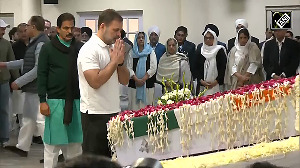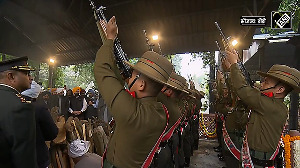The Bush Administration is currently engaged with the United States Congress on the structure of a legislation pertaining to the Indo-US civilian nuclear arrangement and how to bring it up for a vote.
''There is a lot of activity up on the [Capitol] Hill right now, but it is our hope that we can move forward with consideration of legislation this spring and summer,'' State department spokesman Sean McCormack said on Friday.
He also mentioned that Undersecretary of State for Political Affairs Nicholas Burns met Indian Foreign Secretary Shyam Saran in London last week.
''I think they were able to tie up a couple of loose ends concerning things that the Indian Government owed the United States in order to really move forward on this deal,'' he said.
The legislation on the civilian nuclear deal is to be structured in such a way that Congressmen feel comfortable about its language and then work through some other pending issues, he added.
''Our hope is that we can work with the Congress since it is an important deal. It's good for the US, it's good for India and it's good for the world. Secretary of State Condoleezza Rice is deeply involved as well as the White House in trying to move this process forward,'' he informed.
The Indo-US civilian nuclear deal would allow India, which is not a signatory of the nuclear Non-Proliferation Treaty, access to long-denied civilian nuclear technology in return for placing a majority of its atomic reactors under international safeguards.
The deal, to become effective, would have to be first approved by the US Congress and then cleared by the 45-member Nuclear Suppliers Group, which regulates trade in nuclear equipment and technology.
But the legislation, sponsored by the Bush Administration, has been stalled in the legislature as it apparently lacks wide and bipartisan support amid fears that a crowded Congressional year and mid-term legislative elections in November could derail the deal.
Till recently, Republican and Democratic legislators demanded to have a look at the set of safeguards that India is yet to negotiate with the International Atomic Energy Agency as well as the bilateral nuclear agreement between India and the United States that would capture all the key ingredients of the deal.
This new turn in the legislature has spurred the Bush Administration to renewed lobbying with the lawmakers to convince them that the deal offers a crucial energy alternative to rapidly-growing India and would bring New Delhi under the proliferation regime besides, elevating relations between the world's largest and oldest democracies to a new strategic height.






 © 2024 Rediff.com -
© 2024 Rediff.com -